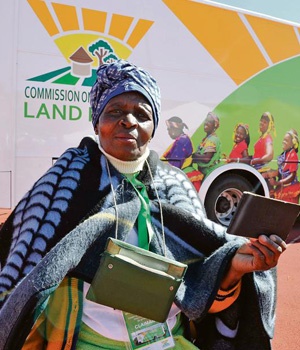
It is a balmy Saturday morning in Phuthaditjhaba, a town in the Free State near the Lesotho border.
Groups of mostly elderly men and women with blankets draped around their shoulders trudge up the steps into Charles Mopeli Stadium towards three buses parked on the grounds.
Over the next few months, these mobile offices will travel from town to town to help people who missed the chance to lodge land-restitution claims before the December 31 1998 cut-off date.
Phuthaditjhaba is the first stop on the long road ahead. The buses, which will stay here for three weeks, even have names: Gemsbok has been assigned to the Free State. It is emblazoned with the Commission on Restitution of Land Rights’ insignia.
Rural Development and Land Reform Minister Gugile Nkwinti is present to witness the first claimants in the country use these offices on wheels. Shady tents have been pitched for the waiting queue.
The generation with first-hand experience of forced removals of black people from their rural homes has come to get them back. For them, this is not only about justice. It is a living memory.
Last Saturday morning, Paulinah Hadebe (74) arrived alone while Fusi Mofokeng (59) was with his sister, Selina (70), and brothers Botiki (64) and Mikgala (57).
They almost missed out on lodging their claims because they did not know where to go until Nkwinti’s department came up with a smart solution: if the people can’t reach the office, bring the office to the people.
The government’s countryside initiative means people such as the Hadebes and Mofokengs will no longer have to travel long distances to provincial Land Claims Commission offices – or miss out again because they simply don’t know what to do.
Inside, each bus is a mini office with banks of computers and four officials capturing information.
Once a claim has been electronically lodged, a letter of confirmation is handed over and a reference number sent to the claimant by SMS. It’s a bit like opening a case file at a police station.
Hadebe travelled 10km from Makwane village to lodge her family’s claim for the first time.
“I did not know where to claim,” she said, explaining why she missed out on the first phase of the process between 1995 and 1998.
Hadebe wants a portion of Rondebeel Farm near Lindley, a small town in the Nketoana municipal area, where she and her parents were born.
She brought her ID, an old dompas and a photo of the farm owner, CS Wentzel.
It is not yet known how many hectares of Rondebeel she might be entitled to, but once Hadebe’s claim is lodged, Land Claims Commission officials will investigate and decide if it is valid or not.
Research will include a search of the deeds office archives and any other features – such as Hadebe family graves or ruins – to substantiate her claim.
Hadebe still has a dompas, the maligned passbook the apartheid government used to control the movement of black people.
She fumbled in her handbag to show City Press she had filled out a log in the dompas of the days she worked under Wentzel in the 1960s and 1970s. She did not know if he was still alive.
“Our problems started when a neighbouring farmer bought a tractor,” said Hadebe.
She said her family had 36 draught oxen, but when Wentzel hired the tractor to plough his fields, he decided he had no further use for the Hadebes.
“We were useless and chased away,” she said.
Hadebe was not sure if she wanted to return to the farm if her claim was successful. She said, at this stage of her life, she might opt for financial compensation.
But Hadebe was clear that whatever she decided to do with the land was her business.
“My parents were born there. I was born there, and worked on that farm without any pay. I feel my family must get the land back,” she said.
The Mofokeng siblings, Fusi and Selina, are claiming Witklip farm near Bethlehem.
They were evicted by the farmer in 1970.
Fusi Mofokeng said his parents were buried on the farm. Like Hadebe, the Mofokengs did not know where to lodge their claim.
Fusi Mofokeng said the farm owner decided they could no longer keep any livestock on the farm.
“He simply told my father to sell his animals or be forced to leave,” he said.
The Mofokengs said if their claim went through, they would like to take up cattle farming again.
Your Rights - How to claim
Laetitia Jansen, a legal adviser for the Free State Land Claims Commission, says the most important thing for claimants to know is the name of the farm and to give a detailed description of the property.
They must also bring certified copies of their IDs, a copy of their family tree and, for those lodging claims on behalf of others, a document granting them power of attorney.
Data capturers will help with drawing up family trees for those who don’t have them.
Knowing the name of the farm is crucial. “The name is important, even if it’s the Sotho name. We can check it on the map and start the research,” says Jansen.
In the mobile office, data capturers put in the claimant’s personal details and copies of documents are scanned and saved in the system.
The claimant will be notified in writing if the claim is valid.
If it is, they will be engaged in the various stages of processing the claim. This includes research, claimant verification and workshops.
Commission spokesperson Pulane Molefe said the time needed to finalise matters varied from claim to claim, depending on the complexity of the case.




 Publications
Publications
 Partners
Partners








